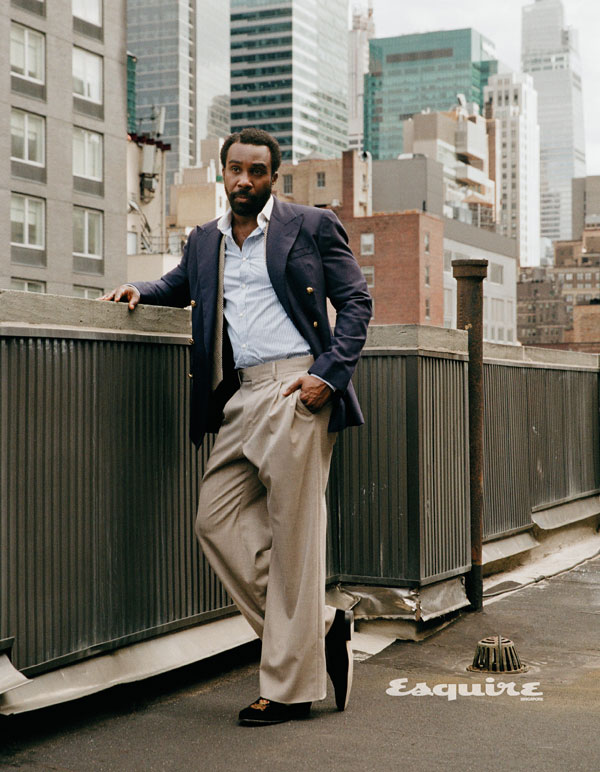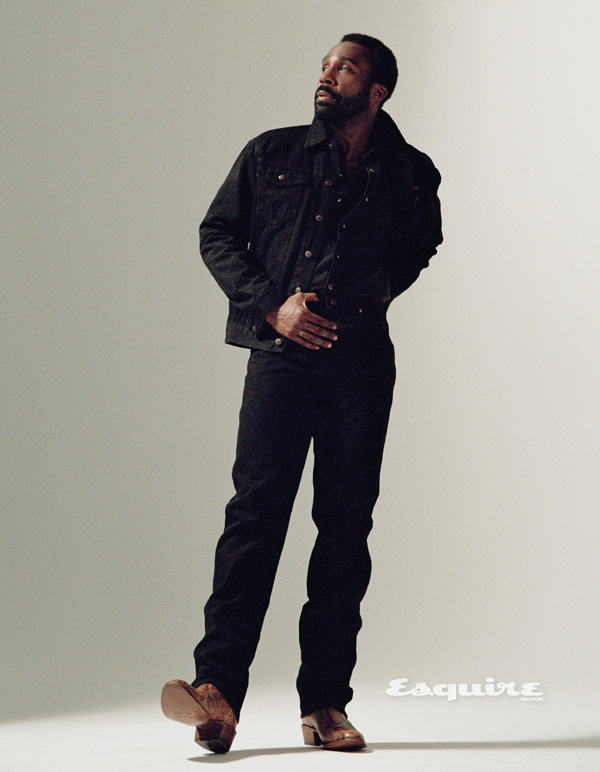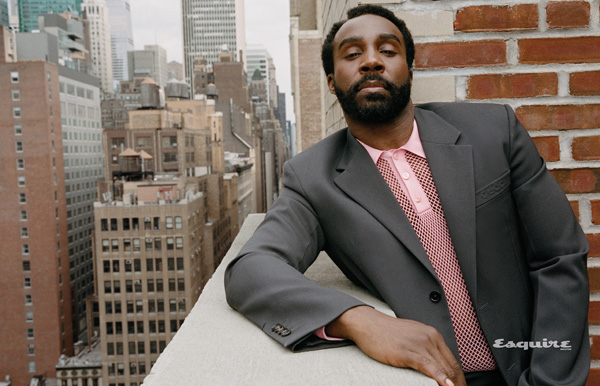Editor's note: Here's another first Emmy nomination and win from the Apple TV+'s Severance crew. Tramell Tillman (who, can we also brag, was our April cover star) also makes history as the first Black man to win an Emmy for Outstanding Supporting Actor in a Drama Series. We revisit his feature from just a couple months prior.
Read our chat with fellow colleague Emmy winner Britt Lower

You are a 20s to 40s, African-American, enthusiastic company man. Specifically, a 39-year-old earnest thespian. Though you weren’t always. You have been an abstinence educator, a communications director, working across both corporate and charitable organisations. You are the youngest of six, and hail from Maryland, USA. You have been called for such a time as this.
Like the persona you embody and have come to cherish, both of you believe in something greater than yourselves; servants to a higher cause. Perhaps you feel you aren’t quite as stoic as him, because you meditate to get into character. You may even think you would not make a good manager in real life. Not the type to exceed quotas, you liken yourself more to a “Mark S”, but your BuzzFeed quiz results prove otherwise.
You admit to sharing a love for words, and an impeccable sense of style. More importantly, you love what you do; almost as much as you love music and dancing. To gain better insight into this performance review, consider the fulfilment of these core principles. Please try to enjoy each facet equally.

You have been very perceptive in discerning the off-kilter world of Lumon, but also what your character represents in the given circumstances. Dealing with severed employees as an unsevered employee, he is a keeper of secrets. Hence, you decided he should have an air of mystery. “Milchick is a really nice man, until he’s not” was what one of them discloses to the other about him, giving you a key indication that this man is able to switch personality and tactics at the drop of a hat. Keeping people on their toes as a means to keep them under your thumb is what you demonstrate in your choice of his cadence, body posture, and highly unnerving smile. You pulled from nature documentaries and cult research. It was a risk you took in your interpretation of the vague description you were introduced to. You don’t know how things are going to be received when creating them, and you do not know if this would go in your favour. Thus, you feel fortunate that alongside everyone diligently finding the tone of the show at the start of Season One, your delivery inspired the writer to enhance your role’s presence.

You convey vivacity by volunteering to lead the live marching band that surprised the crowd at PaleyFest LA 2025. You were speaking with the Apple team who were discussing a big finale; the lasting image of a marching band. You said, Well, if you have a marching band, you gotta have a band leader. You jumped at the opportunity to partner with USC marching band, and it came together beautifully. Better than you had imagined, for you did not foresee a 3,500-strong attendance full of excitement and energy that exploded as you entered the theatre. There is clearly magic when you move, because the world is enthralled by it. Your effortless shimmy among other improvised grooves in the Music Dance Experience upgraded to Choreography & Merriment. It took two weeks spanning rehearsals and total takes. You were taught how to direct and wield the mace, and you spent extra time with the choreographers to perfect it. Here, the structure was crucial to warrant physical safety, repeatable sequences, and the ideal shot, but you were also granted spontaneity within these boundaries.

Many of the band members had not watched Severance prior, and their opinions of you changed throughout the course of collaborating with you on the sequence. A testament to good writing and acting, these musicians went from “really liking you” upon acquaintance, to “feeling conflicted” witnessing your convincing on-screen veneer. You take the negative response as an indication that you’re doing something right. There are viewers who dislike this mien you’ve become associated with through the work. You get that he can appear immensely annoying and manipulative to some; a symbol of the board or the establishment. What you didn’t expect are fellow actors whom you’ve never met, seeming afraid to approach you. You take it as a compliment that they utterly buy into the performance, though it could be a little disappointing because many of them you greatly admire and would have enjoyed a chat.
It means a lot to hear your interviewer say that she feels bad for Milchick, as the epitome of middle-management who is caught between two sides where neither appreciates him. Milchick gets a bad rep, you say emphatically, but this man goes above and beyond for the company. What audiences may deem company orders—ORTBO i.e. Outdoor Retreat and Team Building Occurrence, Egg Bar Social, Visitation Suites, you credit to his initiative to boost kind reforms and work productivity. You display mock exasperation at how he never catches a break for it; instead, bombarded, corrected, and minimised every step of the way. Even to the extent that his speech is policed; culminating in a delicious tension in the pseudo-comedic exchange with the Kier Eagan robot. Unlike his disquieting demeanour, your natural disposition is comparably more at ease. You have just finished Season Two press in Los Angeles the day before, are continuing the leg for a week in London, then heading off to New York for a cover shoot and press for Mission Impossible: The Final Reckoning. Yet, you show no signs of fatigue in answering what must be the thousandth question about your beloved show, adding that you’re purely operating on adrenaline.

You regard your recent, increasing recognition with aplomb. You trust in the significance of timing, and how this happened exactly when it needed. A retrospective look at your life tells you that you would not have been ready if this project had come along earlier. The rich history you have amassed in jobs is fuel for crafting the character. One who is a mediator and caretaker of sorts draws especially from teaching traits. As fellow cast tend to talk of their innies as adolescents, your approach as a supervisor-turned-manager parallels how administrators would handle children. Navigating office politics and getting tasked beyond your scope as an administrative assistant also fed your experience. Every actor possesses a different process. You prefer discovering the similarities and differences where your portrayal overlaps with yourself, as opposed to putting on a guise.

Your stint as an abstinence educator was your least favourite. The kids loved you for your honesty, but you didn’t quite agree with the curriculum. Your time with a non-profit, however, was the most rewarding. At the Children’s Defense Fund, you ran a programme catering to children affected by hurricanes Katrina, Rita, and Wilma. It was empowering to observe them blossom despite the tragedy of displacement. They regained their voice, developed leadership skills, and learnt how they could make an impact on themselves, their families and their country. You found it a gift to usher the return of their joy and confidence, which made the long, hard hours worth it. You helped organise rallies and drives to ensure food, supplies, and every aspect involved. You were raised in the importance of giving back to the community, and lending a hand to those who don’t have as much as you do. To whom much is given, much is required, you quote.
No one needs to tell you how well you run. Particularly the manner in which your alter ego bolts out of the break room the instant Dylan G reaches for the document. The offhand suggestion by director Ben Stiller was one of many takes you thought was incredibly random, but was glad eventually made the cut for its comedic brilliance. You pause to deliberate about the resounding popularity of Seth Milchick. You attribute it to his uncanniness, and simultaneous charm about him. Yet, underneath the charisma, there’s a layer of humanity that is unfolding. An enigma that both you, along with viewers, crave to solve. It is evident that you relish bringing him to life. Your favourite scene this season is introducing the innies to Woe’s Hollow (your favourite line: “Marshmallows are for team players”). The most challenging would be receiving the Kier paintings as the subject of race is raised for the very first time.

Walking in Milchick’s metaphorical shoes and figuring out why his plight resonated with you, you’ve come to realise that you are a reformed people pleaser. You may no longer seek such approval, but you remain prone to introspection. Still, you carry yourself with grace and humour. You are certain it is your faith that grounds you, as do your connection to community and music. Your career, too, in an industry of vast highs and lows, wins and losses. For the sacrifices that artists must make, what gives you solace is tapping into the purpose. The why and who you do this for shifts the focus off of you to channel your energy towards others. You try not to have expectations of others, only of yourself that you are professional and show up in the best way you can. Every endeavour has its flavour and each set bonds the crew uniquely, but all you delight to participate in and foster potentially lifelong friendships.

You contain a plethora of fun facts. For a time, you played the clarinet, the drums, the piano, and the alto saxophone. That’s right, you were in a marching band in Eleanor Roosevelt High School. You acknowledge the full circle moment when pointing out the colour resemblance of your uniform to the ones used in the episode, as well as that of your alma mater’s—Jackson State University—marching band, the Sonic Boom of the South. You had completely forgotten about the photo until it resurfaced online, and it thrills you to see these connective tissues. You directed your first production for the church at 16. You studied to become an orthopaedic surgeon because bones and skeletal structure fascinated you, and your parents were dealing with joint issues and past physical injuries. You had academically surpassed your classmates who are now doctors, but you were bored to tears. Solely engaged by the theatrics of test tube changes in a chemistry lab, the revelation led you to change your major and graduate top of the class in acting as the first African American man of the cohort. You mention without any modicum of arrogance; alternating between serious recollecting and expressions of laughter. You are grateful that you took a chance on yourself, and for the support to pursue your ambitions. You are largely involved in constructing Milchick, down to the items around his desk. You are level when at PaleyFest, Ben Schwartz, the host, asks if we’ve seen the purest form of Milchick. With no hesitation, you smoothly affirm I don’t think we’ve seen it yet.

Photography: Jared Kocka
Fashion Direction: Asri Jasman
Art Direction: Joan Tai
Styling: Julian Fetterman
Grooming: Josh Knight at A-FRAME AGENCY using ORIBE
Set Designer: Rochelle Bennett at THE WALL GROUP
Executive Producer: Alex T
Producer: Nika Bregvadze
Photography Assistants: Nick Grennon and Nick Sansone
Styling Assistants: Lucas Randall and Aidan Scurti
Production Assistant: Daniel Bardzimashvili
Location & Equipment: Go Studios
Film Development: NYC Film Lab
PR Agency: Jill Fritzo Public Relations